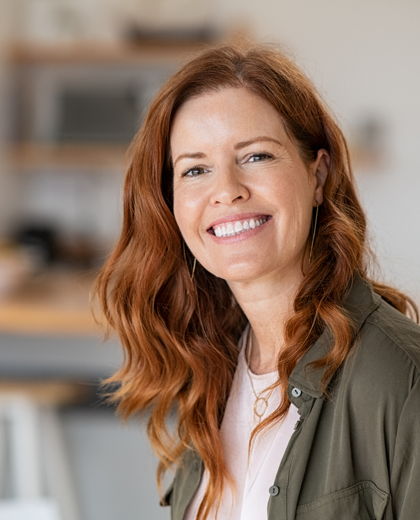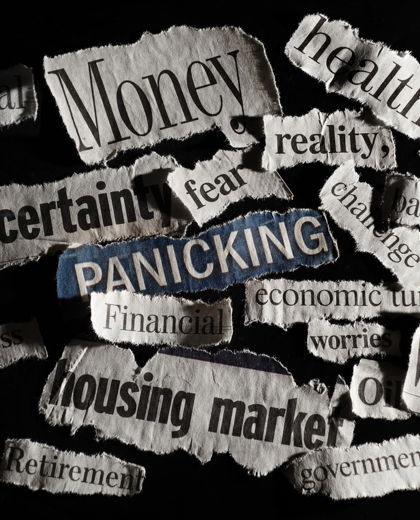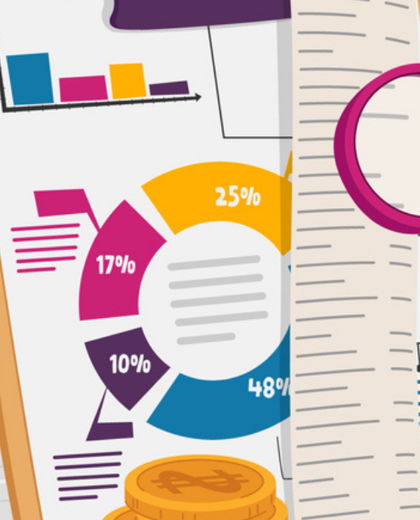Empowering You to Live Your Best Financial Life
Our expertise in financial, investment, and retirement planning will guide your path to financial fulfillment.
Retirement Isn’t What It Used to Be—And That’s Okay
Retirement is changing. With people living longer, a 30-year retirement may require more income than expected. This blog explores how to prepare financially—and mentally—for a retirement that may still include work.
The Hidden Opportunity in Every Market Crash
Discover why a market crash isn’t always bad news for your financial future. Learn how falling stock prices can create opportunities to buy quality investments at a discount, setting you up for greater long-term gains. Understand the power of diversification and why patience is key to turning market downturns into wealth-building moments.
Can You Access Your Wealth When You Need It Most?
The ability to access your money quickly during emergencies is crucial for financial stability. In this blog, we explore why liquidity should be a top priority when building an investment portfolio, the risks of illiquid investments, and how simple, daily-traded securities can provide the peace of mind you need when unexpected events arise.
Why Smart Investors Start by Admitting What They Don’t Know
After 30 years in finance, I’ve learned no one consistently beats the market. This blog shares a better approach: global diversification, emotional resilience, and realistic goals. Forget stock tips—focus on a strategy you can stick with, even in downturns, to reach your personal financial objectives.
Don’t Be Fooled by the Word ‘Guaranteed’
Not all guarantees are created equal—especially in investing. This blog explores the truth behind “guaranteed returns,” why real long-term growth comes from the stock market, and how economic resilience shapes smart investment strategy.
Invest Smarter, Not Harder
Most investors underperform the market — and it’s not because they pick the wrong stocks. The problem? Emotional decisions. We tend to buy high when the market feels safe and sell low when fear takes over — exactly the opposite of what works. This blog breaks down why it happens and how you can build a smarter, long-term strategy to avoid this common pitfall.
Navigating Life's Financial Trade-Offs
Short-term sacrifices. Long-term rewards. It’s the cornerstone of financial success—but how do you know if the trade-offs you’re making today will lead to a better tomorrow? Get ready to explore how to align your daily decisions with your values and financial goals.
How Space Exploration Changed the World—and Your Investments
The technology we rely on today—like virtual reality and mobile tools—was once science fiction. Thanks to the space race, these are now part of everyday life. Progress is unstoppable. The question is: Are your investments aligned with the growth ahead?
How to Prepare for Market Crashes: Essential Tips for Investors
Market crashes are unpredictable—but they don’t have to derail your financial journey. The key to surviving (and thriving) during market downturns lies in preparation. Think of it like being a scout: always ready for what’s to come.
The Truth About Market Volatility: How to Keep Calm and Stay Invested
Feeling overwhelmed by market volatility? Stop stressing over short-term swings. Learn how to build a resilient portfolio and invest with confidence for the long term. Discover proven strategies to stay the course and achieve your financial goals.
Why Money Is More Than Just Currency: Understanding Its True Value
How much is enough to sustain your lifestyle? Learn the key difference between currency and money, why inflation matters, and how to plan for a secure financial future.
The Great Investment Lie
True investment success comes from patience, discipline, and sticking to your plan, even in turbulent times. Don’t fall for the myth—focus on the steady, proven approach that truly grows wealth over time.
Why It Pays to Pay Taxes
Most people will delay paying tax as long as possible. We see this quite often in taxable investment portfolios where you can choose to sell investments with gains or losses when readjusting your portfolio.
Why Did Goldilocks Get It Wrong?
First things first, Goldilocks is a thief – let’s just get that out of the way. But have you ever happened to notice the other, less obvious way that Goldilocks got it all wrong? Together we will explore that answer as it relates to your – you guessed it! – finances, but more specifically, we will look at how it refers to the type of accounts you can use to store and grow your wealth.
The Last Dumb Investor
Given the market has always risen over any 17-year period, this poor soul must have bought on October 9, 2007, just before the S&P 500 index threw in the towel and dropped nearly 50%. That dumb buyer would have “lost” half their money in just a little over a year.
Three Requirements for a Successful Stock Portfolio
The only thing that matters when it comes to your portfolio is something that cannot be answered until you are dead and gone: did it fund all the expenses you planned for and help you achieve all your financial goals in life? With that in mind, let’s define and discuss what is required to make your portfolio successful.
How to Save Time on Your Finances
When it comes to assessing and changing your financial life, what’s holding you back? Is it finally weeding things out and making the change? Is it the inertia or that you find yourself falling back into old habits? No matter what it is, if you genuinely want to spend less time and find more value, you need to break the habits, commit to the change, and weed things out.
How to Avoid Putting All Your Eggs in One Basket
The phrase in the title of this post is said to have been first used in the novel “Don Quixote,” and is written as follows, “It is the part of a wise man to keep himself today for tomorrow, and not venture all his eggs in one basket.” The message, of course, is that it can be quite risky to keep all your valuables in one place.
Why Volatility is Good
Higher risk must be accompanied by higher potential rewards. To get that, we have to accept more volatility and that’s what the stock market provides. Even a well-diversified portfolio will move up and down with the markets, so let’s structure a portfolio so we can live within the good times and the bad!
Faith In The Future
People do it all the time. In the face of their worst imaginable fears, they do it. Probably not because they want to. They do it, maybe, because that’s the way we humans are wired. What do they do? They continue. And the only thing that might be driving them is faith in the future. A faith that the future will be better.
7 Mistakes Investors Make
We all make mistakes – I know I’ve made my share. But for some reason, when it comes to investing, we are prone to repeating our mistakes – over and over. I think it’s because the “lesson” we tell ourselves we learned isn’t the right one.
Rely on the Wisdom of the Crowd
If we invest in a market-like portfolio, with wide diversification and diligence around our appropriate asset allocation, we can predict the return it will provide fairly well. It takes planning to ensure we can do everything we want given the realistic returns we can expect from such a strategy.
Protect Your Assets by Understanding Your Exposure
Many of my clients originally reached out to me because they have a lot of company stock and don’t understand what it is or when to sell it. They are aware they lack “diversification,” but don’t know what to do about it—or if diversification is a big deal at all.
I Just Sold Some Stock—Now What?
You’ve finally pulled the trigger, selling a chunk of your company stock and leaving you with a pile of cash sitting in your brokerage account. What now? Now you have a pile of cash and need to know what to do with it. Let’s talk about that.
Give a Job to Every Dollar You Have
In today’s busy world, you might often feel like you’re drowning in responsibilities to your family, coworkers, clients, and even your neighbors. There’s always someone or something saying you ought to be doing something.
Make Your Extra Cash Work For You
Some people are concerned about spending their extra cash, while others are concerned that they’re not investing it. In either case, this situation can easily be avoided through a simple process that makes your cash work for you.
Successful Investing: The Value of a 5-Year Cash Flow Plan
How should you invest the money you plan to spend in 2 years to buy a house/boat/car or go on a trip? The answer is, you shouldn’t. In this blogpost, we discuss how to truly get into the mindset of a long-term investor by projecting your net cash flows over the next five years and being sure NOT to invest them.
Strategize Your Finances: Put Your Cash Where It Counts
Having more income than you spend feels good, yet it’s crucial for us to recognize that this is, in fact, necessary. If you ever want to spend any time without income in your life – whether it’s retirement, a sabbatical, or whatever – then you must earn more than you spend.
Don’t Set It and Forget It
Ok, so you’ve bought into ignoring short-term market fluctuations, but it’s likely not that simple. In my experience the idea of investing for the long run can fade quickly when the market gets stressed.
Unlocking the Power of Diversification: The Key to Financial Success
It is unfortunate, but to understand why diversification works, we must understand a little math. This mathematical magic is the key to constructing a portfolio that your well-thought-out financial plan deserves: a beautifully diversified investment strategy!
Why SVB Is Important For Your Portfolio
On March 8th, SVB was trading at $267 per share. By March 10th, you couldn’t give your SVB stock away. Investors lost $16 billion in 2 days. It’s easy to say, in hindsight, that it couldn’t happen to you, but there are some 8500 employees who just lost tens of millions of dollars in their company stock.
Where to Put Your Extra Money
Ok, so, you are maxing your retirement plans, you’ve got your college funding figured out and you have plenty of money for emergencies and other upcoming expenses – but you still have money left over. What to do?
Why Diversification Works
It is unfortunate, but to understand why diversification works, we must understand a little math. This mathematical magic is the key to constructing a portfolio that your well-thought-out financial plan deserves: a beautifully diversified investment strategy!
The Upside To A Market Crash
If you are in the savings/investing mode, would you rather stock prices today be over or under the true value of the companies you are buying?
The Importance of Having Access to Your Money
Needing access to your investment accounts in an emergency creates enough of a logistical hurdle but holding investments that may take weeks or months to sell can really cause a problem.
Your Investments Should Be Experienced
When investing, it is easy to be attracted to the various vehicles, sectors, and strategies that surround us. Wall Street (and other financial agitators) knows this and they invent new angles every day with the primary goal of getting into your pocket.
Use The Markets Like a Tool
Investing has become a game to most, but it should never be approached this way. From meme stocks to crypto, many of you are being far too cavalier with your investments.
Realize That…You Just Don’t Know
Having invested other people’s money for more than 30 years and studied other managers doing the same, it is clear to me that the markets cannot be beaten.
A Guarantee That’s Not Truly Guaranteed
Do you want a guaranteed investment return? If you answered yes, I hope you added the condition that it depends on who is providing the guarantee and what that guarantee actually is.
Don’t Just Do Something! Stand There!
The annual update to DALBAR’s Quantitative Analysis of Investor Behavior (QAIB) study confirmed once again that when we make moves in our portfolio, we are much more likely to be losers rather than winners.
You Can Never Go Back
Our technological progress has only just begun. If you want to participate in this growth financially, the best approach is through company ownership in a diversified fashion among industries, geographies, and sectors.
Do Not Consider Investing in Real Estate (Including Your Own Home) With More Than 20% of Your Assets
If you create a pie chart of all your investment assets and real estate is more than 20%, do not consider investing in more real estate. I understand that your home may, itself, be greater than 20% and I’m ok with that because it is much more than just an investment.
Sell Your RSU and ESPP As They Vest
Your Company Stock awards are part of your total compensation for work. They are not a bonus and they are not lottery tickets. You work hard for your company and part of your pay includes these stock awards.
Rebalance Your Portfolio
Your Long-Term Portfolio has target percentages for each fund and asset class. We start investing by placing those amounts in each fund so that we are perfectly balanced. The day you initially invest will be the last day you are perfectly balanced.
Structure a Portfolio Whose Behavior in Market Crashes is Acceptable
If you are 40 years old, you will likely experience 5 to 8 more market crashes during the rest of your life. You can try to predict them and trade through them, but history says you won’t be successful as no one has ever done so through more than one or two.
Pay No Attention to the Financial Media
The old school big firms in the financial industry make their stock market money one way. By processing transactions. They don’t care if you are successful as long as you do something and pay them a fee or commission.
Invest Everything Above Your Savings Target in Your Long-Term Portfolio
Your Savings Target is the amount you want in savings so by definition, anything above this amount should be invested in your Long-Term Portfolio.
Do What’s Always Worked
When tying your future wealth to something through investment, be sure what you are doing has always worked in the past. Don’t be distracted by the odd strategy or “opportunity.”
Be Patient
I’m so glad that today’s culture has finally given a name to something that has killed many investors in the past. FOMO. When you hear about the fear of missing out, doesn’t it make you realize that this is something you should not be concerned with?
Be Diversified
We’ve all heard that we should be diversified, but what does that mean? It means to own a lot of things that you expect to do well over time but that don’t always do well at the same time.
Have an Investment Philosophy
Here’s how most people invest: Act on impulse, React to things they see in the news, Do what their friends are doing, Do their own research and convince themselves they can see what the future holds, Bet their life savings on tips and hunches. Don’t be like most investors!
Have a Cash Flow System
Every dollar you have should have a job. If you aren’t giving a job to every dollar then your dollars are working against you.
Get to Clarity, Control & Intention
What is Financial Planning? I like to think about it in a very simple way. You need to have clarity in your finances before you can have control. Once you have control, you can be very intentional.
Plan to Leave Highly Appreciated Assets to Your Heirs
Today we are talking about legacy gifting. You may think you are too young to think about this, but I think you’re never too young to begin structuring your investments for the right long-term outcome.
Consider Making Roth Conversions Regularly
Last week we talked about the three types of accounts we can use for our Long-Term Portfolio and I said it’s important to have balances in all three types. The Already-Taxed or Roth account is the most difficult to contribute to so I want to talk this week about how we can get money into a Roth by making conversions.
Use All 3 Tax Structures for Your Long-Term Portfolio
We want to use all three of these when investing our Long-Term Portfolio and I’ll tell you why in a moment. But first, I want to talk through how each of them works.
Have a Long-Term Portfolio Strategy in Place for Your Cash from Selling Company Stock
Once you have a plan in place to sell your Company Stock over time, be sure that money has some place to go. We don’t ever want our money to be without a job and the cash you get from your Company Stock is no exception.
Know the Tax Effect of Selling Your Company Stock
Taxes are a fact of life. I talk to a lot of people who are trying to find the super-secret way that people with money avoid paying taxes. I’m here to tell you – it doesn’t exist.
Risk-Reward of Your Company Stock
We make decisions in everyday life based on seeking a reward given the risk we are willing to take. Without risk, there is no reward.
Do You Have Too Much Company Stock?
Diversification is the key to any successful portfolio. However, recently, individual tech stocks have been all over the news and I’ve been getting asked, “How much company stock should I have?” or “Do I have too much?”




























































